 |
|
|
 |
 |
 |
Breed Profile
--Written By Alison OíSullivan

Breed: Coonhound
The Coonhound group consists of six distinct, purebred breeds including the Black and Tan, Bluetick, English, Redbone, Treeing Walker and the Plott hound.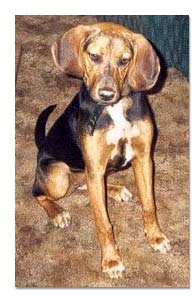
Owner Level:
Experienced Dog Owners Recommended
Average Height:
20-30 inches
Average Weight:
50-70 lbs
Average Life Span:
12 years
Color And Coat:
Colors vary. The coat is short and dense and requires minimal grooming. An occasional brushing is usually sufficient. Shedding is minimal.
Typical Health Problems:
Coonhounds usually have excellent health. However, due to their long floppy ears ear infections can occur. Breed related health problems are uncommon (ie. hip displaysia, ectropion, and hemophilia).
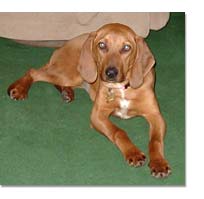 History and Personality: History and Personality:
Coonhounds history can be traced back to eleventh century England. Coonhounds were originally bred to be used principally for trailing and treeing raccoon. Coonhounds are scent hounds and run their game entirely by smell. Once the quarry has been cornered or treed, the Coonhound changes his tone of voice to notify his master of his success and location. Coonhounds are first and foremost a working dog, a trail and tree hound, capable of withstanding the rigors of weather and difficult terrain over which they are called upon to work. The characteristics and courage of the Coonhound also make them proficient on the hunt for deer, bear, mountain lion and other big game.
Coonhounds are generally even tempered, outgoing and friendly. Despite the tough exterior coonhounds are very sensitive. It is very easy to hurt their feelings. Coonhounds are also very expressive, if you have hurt their feelings they look absolutely miserable. Coonhounds mature slower than most breeds. Coonhounds do not "grow up" until they are approximately 2 years of age.
Why are these dogs typically in animal shelters?
Coonhounds typically end up in shelters for a variety of reasons: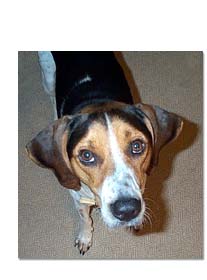 - As a stray. Coonhounds are scent hounds. If not left in a securely fenced yard their noses will lead them astray. Coonhounds do not make good off leash dogs unless they are extremely well trained.
- Problem behaviors. Coonhounds were bred to be pack animals. This means if they are left alone for long periods of time they will typically develop problem behavior such as fence climbing, chewing, digging, or barking.
- This breed, although smart, can be stubborn to train. Conventional training does not work with coonhounds. Spanking a coonhound can damage their trust and they can easily become shy and frightened. These dogs are often dumped in shelters by owner unwilling to take the time to properly train them.
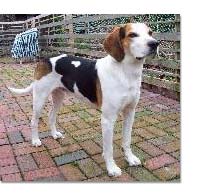 How do these dogs handle shelter life? How do these dogs handle shelter life?
They donít. Coonhounds in shelters either become frantic and start barking and jumping on the kennel or they become depressed. It is very common for them to quit eating and become emaciated.
Who should own this breed?
The ideal coonhound owner should be patient and committed to giving them the attention and training they require. Many coonhound owners have found themselves overwhelmed and unprepared for the time and attention this breed requires. People that work long hours or are away from their home for extended periods of time should not own a coonhound. Coonhounds are pack animals and leaving them isolated for long periods of time is cruel. Many coonhounds do have a strong prey drive. If you have cats or other small animals a coonhound may not be the dog for you unless it has been raised with them. Coonhounds can have loud voices and are not typically suited for apartments, condominium or city living.
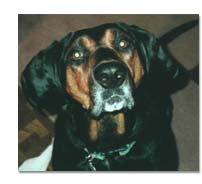 Is this breed good with children? Is this breed good with children?
Coonhounds make excellent family pets. They are good with children of all ages and usually take all the petting that is dished out. However, no dog should ever be left unsupervised with children; children donít always know how to treat a dog and every dog does have its limit.
Is this breed good with other dogs in general?
As a working scent hound, coonhounds must be able to work in close contact with other hounds. Therefore typically coonhounds get along very well with other dogs.
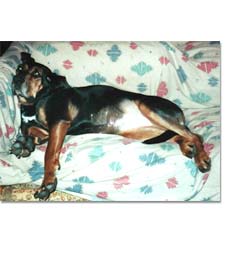 How easy is training and housetraining with this breed? How easy is training and housetraining with this breed?
Coonhounds have a reputation for being stupid and difficult to train. Training a coonhound is not hard if you go about it the right way. Most coonhounds are very food oriented and will do almost anything for a dog cookie. Due to their affectionate, social personality, if you donít train your hound you will have created a monster(jumping up or putting their noses into inappropriate places). |
|

